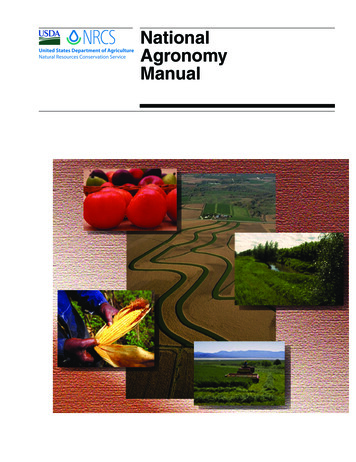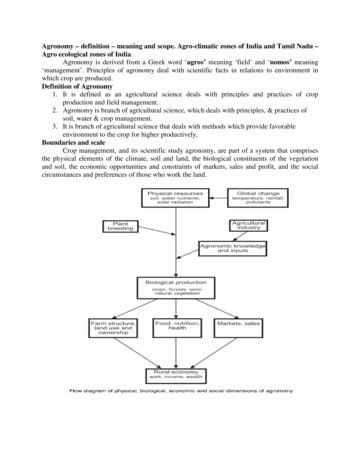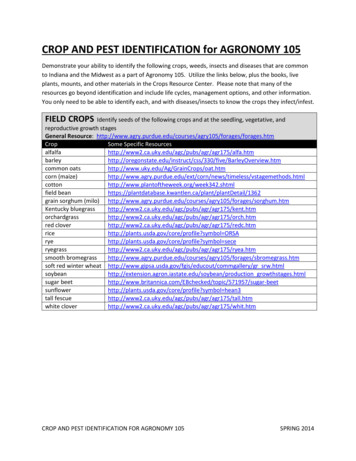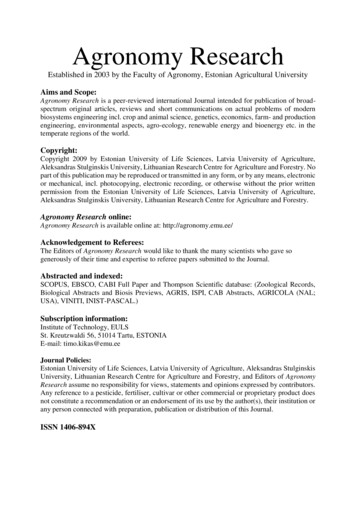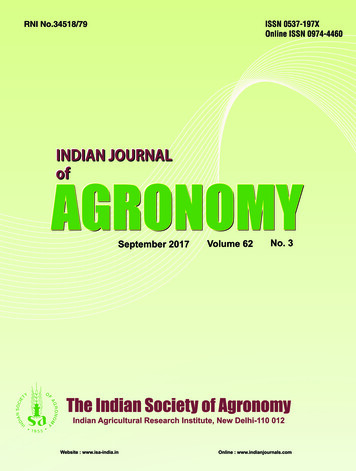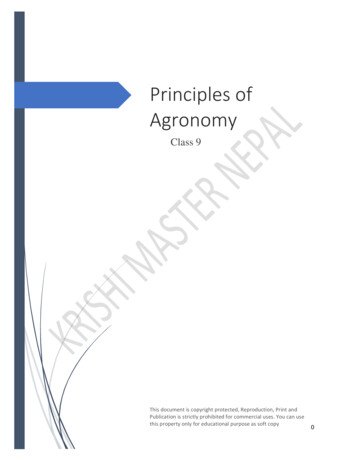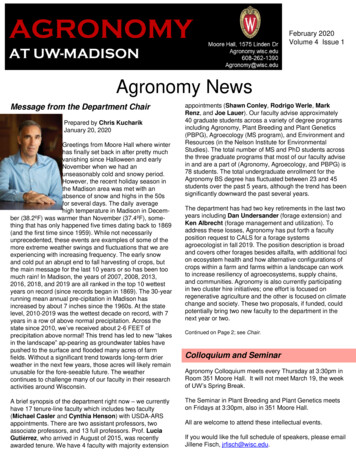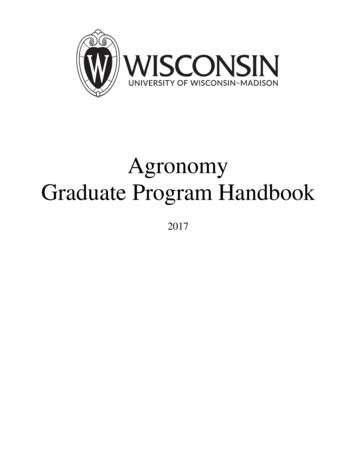
Transcription
AgronomyGraduate Program Handbook2017
UNIVERSITY OF WISCONSIN-MADISONAcademic Policies andProcedures HandbookAgronomy MS and radhandbook/Updated July 2017
Table of ContentsI. DEPARTMENT OVERVIEW . 5Intention/Role of Handbook. 5Mission Statement . 5Department Structure. 5Administration . 6Program Faculty and Their Areas of Study . 6Learning Outcomes . 6MS . 6PhD . 7Areas of Specialization. 7Agroecosystems. 7Molecular Biology . 8Plant Physiology and Biochemistry . 8Plant Breeding and Plant Genetics . 8Weed Science . 9II. MINIMUM REQUIREMENTS. 9Minimum Graduate Residence Credit Requirement . 9Minimum Graduate Degree Credit Requirement . 10Minimum Graduate Coursework (50%) Requirement . 10III. MASTER’S DEGREE REQUIREMENTS . 11Course Requirements . 11Plan of Study . 11Committee Selection . 11Program Options . 11Minor Requirement . 12Exit Seminar . 12M S Oral Exam. 12Thesis Deposit . 12Timelines and Deadline Requirements . 12IV. DOCTORAL DEGREE REQUIREMENTS . 12Course Requirements . 12Minor Requirement . 13Committee Selection . 13Certification . 131
Research Proposal . 14Preliminary Examination . 14Dissertator Status . 14Dissertation . 15Exit Seminar . 15Final Examination . 15Timelines and Deadline Requirements . 16V. ADDITIONAL PROGRAM REQUIREMENTS AND OPPORTUNITIES. 16Non-faculty Committee Members . 16Double, Joint and Dual Degrees . 16Seminars . 17Agronomy Colloquium . 18Teaching . 18VI. DOCTORAL MINOR IN AGRONOMY . 18Requirements . 18VII. ENROLLMENT . 19Course Waivers . 19IX. SATISFACTORY PROGRESS – ACADEMIC EXPECTATIONS . 20X. CONDUCT EXPECTATIONS . 20Professional Conduct . 20Academic Misconduct . 22Non-Academic Misconduct . 22Additional information regarding Non-Academic Misconduct . 23Research Misconduct . 23XI. DISCIPLINARY ACTION AND DISMISSAL . 24Disciplinary Actions. 25Additional Information . 25XII. GRIEVANCE PROCEDURES & REPORTING MISCONDUCT AND CRIME . 26Grievance Procedures . 26Reporting Misconduct and Crime . 27Research Misconduct Reporting . 27Academic Misconduct Reporting . 27Sexual Assault Reporting . 27Child Abuse Reporting . 27Reporting and Response to Incidents of Bias/Hate . 28XIII. FUNDING AND FINANCIAL INFORMATION . 282
Overview: Funding Landscape . 28Research Assistantships. . 28Teaching Assistantships. . 28Fellowships and Scholarships. . 28Program/Project Assistantships. . 28Time Limits . 29Tuition Remission and Payment of Segregated Fees. 29Maximum Appointment Levels . 29Stipend Levels and Paychecks. 29Working Hours, Sick Leave, Vacation Time . 29Income Taxes. 29Payroll and Fringe Benefits . 30Health Insurance . 30Fellowships . 30Graduate School Fellowships . 30Departmental/Campus Fellowships . 30External Funding/Fellowships . 31Fellows with Concurrent Appointments. 32Funding for Study Abroad . 32Loans . 32XIV. PROFESSIONAL DEVELOPMENT AND CAREER PLANNING . 32Campus-wide Resources for Professional Development . 32Individual Development Plan . 33Travel to Meetings and Conferences . 33Funding for Conference/Research Travel . 34XV. OPPORTUNITIES FOR STUDENT INVOLVEMENT . 34Student Representation in Governance . 34Registered Student Organizations . 34Departmental Committees . 35Plant Breeding Journal Club . 35Plant Sciences Graduate Student Council . 35XVI. STUDENT HEALTH AND WELLNESS . 35Health Insurance Coverage. 35Disability Information . 36Mental Health Resources On and Off Campus . 36XVII. ADDITIONAL INFORMATION FOR INTERNATIONAL STUDENTS . 373
International Student Services (ISS) . 37Student Visas . 37Documents required of new international students . 38Students with ESL requirements . 38Funding for International Students. 38APPENDIX. 39Certification of Candidate for PhD Degree . 394
I. DEPARTMENT OVERVIEWIntention/Role of HandbookThis handbook is intended for graduate students who are pursuing an Agronomy degree. The Graduate School isthe ultimate authority for granting graduate degrees at the University. The Department of Agronomy administerstheir graduate program under the authority of the Graduate School.The Graduate School’s Academic Policies and Procedures provide essential information regarding generalUniversity requirements. Program authority to set degree requirements beyond the minimum required by theGraduate School lies with the Agronomy faculty. The policies described in this handbook have been approved bythe program faculty as a whole.Degree and course requirements may change over time. You as a student must meet the degree and courserequirements in effect when you enter the program. In addition, administrative procedures and processes canchange over time. You are required to follow the procedures and processes listed in the current handbook. Thisinformation should be supplemented by consultation with your advisor and committee so that your individual needsand interests and all degree requirements are met. You may also wish to consult the Agronomy website andGraduate School website.Mission StatementThe mission of the Department of Agronomy at the University of Wisconsin-Madison is to generate, integrate, andapply knowledge about crop plants grown by humans for food, feed, fiber, and fuel. Through the integration ofteaching, research, and extension/outreach efforts, we address problems and discover opportunities concerning theefficiency and sustainability of production, improvements in quality, and methods for safe and environmentallysound practices. While cultivating a positive, diverse, and inclusive working and learning environment, we strive toensure that agricultural systems and products in Wisconsin, the USA, and international communities are able tomeet rapidly-changing current needs and those of future generations.Department Structure The department will assign new graduate students an office space upon arrival. Keys for the building andoffice are rented through the Department Administrator, Sandy Bennett. There is a 5 deposit for an office keyand a 10 deposit for a building key. Deposits will be returned to you when you complete your time here.In the event that you have forgotten your keys or need other quick access, a master key is available in the mainoffice to borrow. This key must be used and returned promptly.Copiers are located in Rooms 371 and 373. Office supplies, mailboxes, and the fax machine (608-262-5217)are in Room 371. There is one color copier and one copier that is connected to the network. Each lab has anassigned copy number to track copy charges.USPS mail comes to the office every day around one pm; UPS comes to the loading dock in the morning and ispicked up around four pm. FedEx can come throughout the day. If you are bringing a package to be sent out byFedEx, the deadline is one pm.We will not notify you of the arrival of packages, unless the package contains dry ice or needs other quickattention. It is your responsibility to track your packages and retrieve your mail.Departmental mailing address to be used for professional correspondence is:Department of AgronomyUW-Madison5
1575 Linden DriveMadison, WI 53706Office hours are 7:45 to 4:30 M-F; we are closed for lunch from 11:45 to 12:30.The HR contact is Sandy Bennett, skbennet@wisc.edu .Travel and purchasing contact is Amy Cottom amy.cottom@wisc.edu.IT support contact and building and facilities contact is Tom Frank tjfrank@wisc.edu.The Graduate Student Services Coordinator is Joanna Schuth, 373 Moore Hall, jschuth@wisc.edu.The Graduate School maintains a checklist for new graduate students. We encourage every new graduatestudent to visit this checklist and take care of as much as possible before the new school year.AdministrationWilliam F. Tracy, ChairShawn Conley and Natalia de Leon, Associate ChairsSandra Bennett, Department AdministratorProgram Faculty and Their Areas of StudyKen Albrecht, ProfessorJean-Michel Ané, ProfessorMichael Casler, ProfessorShawn Conley, ProfessorNatalia de Leon, ProfessorStan Duke, ProfessorLucía Gutiérrez, Assistant ProfessorCynthia Henson, ProfessorRandy Jackson, ProfessorMolly Jahn, ProfessorHeidi Kaeppler, Associate ProfessorShawn Kaeppler, ProfessorChris Kucharik, ProfessorJoe Lauer, ProfessorValentín Picasso, Assistant ProfessorMark Renz, Associate ProfessorDavid Stoltenberg, ProfessorBill Tracy, Professor and ChairDan Undersander, ProfessorForages and grazing systemsPlant-microbe symbiosesGenetics and breedingSoybean & small grain productionPlant breeding and plant geneticsBarley malt qualityCereal crops breedingPlant physiologyGrassland ecosystems, agroecologyRisk in food systemsCereal crops geneticsPlant breeding and plant geneticsEcosystems, land management, biogeochemical cyclingCrop management (corn)Forages and grazing systems, agroecology, sustainable agricultureWeed scienceCropping systems, weed science, agroecology, sustainable agriculturePlant breeding and plant genetics (sweet corn)Forages and grazing systemsFor full descriptions of each faculty’s research interests, see their individual pages on the Agronomy website.Learning OutcomesMSKnowledge and Skills Learning Goals6
Articulates, critiques, or elaborates the theories, research methods, and approaches to inquiry or schools of practicein the field of study. Identifies sources and assembles evidence pertaining to questions or challenges in the field of study. Demonstrates understanding of the primary field of study in a historical, social, or global context. Selects and/or utilizes the most appropriate methodologies and practices. Evaluates or synthesizes information pertaining to questions or challenges in the field of study. Communicates clearly in ways appropriate to the field of study.Professional Conduct Learning Goals Recognizes and applies principles of ethical and professional conduct.PhDKnowledge and Skills Learning Goals Articulates research problems, potentials, and limits with respect to theory, knowledge, or practice within the fieldof study. Formulates ideas, concepts, designs, and/or techniques beyond the current boundaries of knowledge within thefield of study. Creates research, scholarship, or performance that makes a substantive contribution. Demonstrates breadth within their learning experiences. Advances contributions of the field of study to society. Communicates complex ideas in a clear and understandable manner.Professional Conduct Learning Goals Fosters ethical and professional conduct.Areas of SpecializationCrop Production and ManagementThe majority of this research is of an applied nature generally conducted under field conditions. Presently, researchin this area emphasizes: forage crop nutritive valuechemical composition and preservationcultural practices for maximizing crop returns including fertilizer practices and mineral nutrition of crop plantsthe use of chemical growth regulators for crop yield enhancementcrop sequencetillage interactionsweed control practicessustainable agricultureBotany, soils and agronomy courses are recommended for students specializing in crop production andmanagement. Ph.D. students in this area frequently minor in botany or plant pathology, but other options, includingsoils or plant breeding and plant genetics, exist.Agroecosystems7
The majority of this research is of an applied nature generally conducted under field conditions. Presently, researchin this area emphasizes: cropping systemsorganismal interactionssoil ecologyatmospheric scienceplant ecologysimulation modelingBotany, soils and agronomy courses are recommended frequently for students specializing inagroecosystems. Ph.D. students in this area frequently minor in botany or soils, but other options exist, includingentomology, plant pathology, and plant breeding and plant genetics.Molecular BiologyThe techniques of molecular biology are being used to analyze various traits affecting crop productivity or quality.Some of the specific areas of interest in the Agronomy Department include: the identification and use of DNA restriction fragments as genetic markers in crop plants and the analysisof molecular events associated with the generation of new genetic variationthe molecular analysis of the expression of genes affecting crop qualitythe genetic construction of Rhizobium strains that are competitive for nodulation and provide increasedlegume productivityCourses in molecular biology, genetics, biochemistry and botany are emphasized to students with interests inmolecular biology. These students may choose from a wide variety of minors including genetics, plant pathology,bacteriology and biochemistry. The University also offers a graduate program in Cell and Molecular Biology whichhas separate admissions requirements. Students admitted to this program can be advised by Agronomy professorswho are members of the program.Plant Physiology and BiochemistryPlant Physiology and Biochemistry research involves the study of fundamental processes of growth, developmentand metabolism in crop species. Current research being conducted in the Agronomy Department emphasizes: nitrogen and carbon metabolismenzyme functions, seed development and germinationinterfacing plant biochemistry, molecular biology and physiology with breeding and geneticsPlant physiology and biochemistry students obtain a strong background in chemistry, biochemistry and botany.Biochemistry and/or botany are frequently chosen by these Ph.D. candidates for a minor field of study.Plant Breeding and Plant GeneticsPlant breeding and genetics research focuses on the major Wisconsin crops: cornforage legumes and grassessmall grainssoybeans and peas8
Both basic and advanced research is conducted utilizing whole plant, biochemical, molecular and cytogenetictechniques. Most research involves concentrated field work in the summer, supplemented by greenhouse andlaboratory research during the fall and spring semesters.Many students interested in plant breeding and genetics elect to obtain their degree under the Plant Breeding andPlant Genetics program. Those electing this option must fulfill the requirements of that program. However, they arehoused in Agronomy (if their advisor is in Agronomy) and participate fully in activities of the AgronomyDepartment.Weed ScienceResearch in the area of weed science is of both an applied and basic nature. Applied research is primarily directedtowards control of annual and perennial weed species in row crops and forages.Applied (field) research includes: experiments studying crop rotationminimum-tillage practicescontrol of problem weedsherbicide evaluationmodifications of cultural practicesBasic research (weed physiology and biochemistry) currently emphasizes: absorption and translocation of herbicides by plantsenzymology of herbicide metabolismmechanisms of herbicide action and selectivityherbicide properties and persistence in soilBotany, soils, entomology and plant pathology course work is emphasized
Students admitted to this program can be advised by Agronomy professors who are members of the program. Plant Physiology and Biochemistry Plant Physiology and Biochemistry research involves the study of fundamental processes of growth, development and metabolism in crop species. Current research being conducted in the Agronomy Department .

